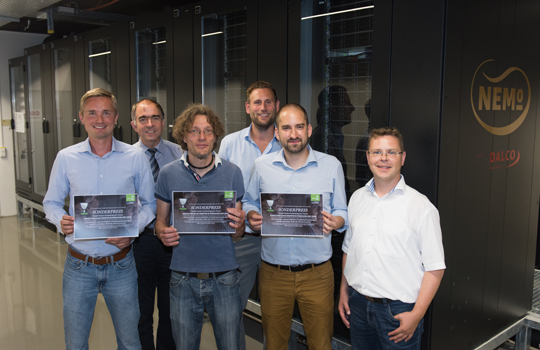Releasing software from the hardware
Freiburg, Aug 11, 2017
Academics from various disciplines require specialized software environments tailored to research and teaching in their field. How can university IT services meet this demand and still use their resources economically? The University of Freiburg's IT Center has found a way: virtualization – which put simply means releasing software from the hardware. The team presented its approach at the Communications Technologies Forum of Germany's National Research and Education Network (DFN) and received a special prize for their work from IT service provider Dimension Data.

Source: Weissblick/Fotolia
The approach has been used in teaching for some years already: in the "bwLehrpool" cooperation project of the University of Freiburg and the University of Applied Sciences Offenburg. The idea is that only one reduced operating system runs on the computers in the computer pools. "The teachers can set up a virtual machine there, with an operating system such as Windows, Linux or Ubuntu, and the programs that each of them requires," explains Dr. Dirk von Suchodoletz, Head of E-Science at the University of Freiburg's IT Center. Virtual machines are made available via the bwLehrpool server and then individually configured by the teacher on their own computer. Since it is possible to launch them in a special examination mode, they are also suitable as an environment for e-examinations.
 Special prize for Freiburg IT specialists: Konrad Meier, Dirk von Suchodoletz and Clemens Blank (l to r with certificates) receive their awards from Andreas Balda and Matthias Körbitzer (from r) of Dimension Data – to the delight of Gerhard Schneider, Director of the IT Center of the University of Freiburg (back left). Photo: Patrick Seeger
Special prize for Freiburg IT specialists: Konrad Meier, Dirk von Suchodoletz and Clemens Blank (l to r with certificates) receive their awards from Andreas Balda and Matthias Körbitzer (from r) of Dimension Data – to the delight of Gerhard Schneider, Director of the IT Center of the University of Freiburg (back left). Photo: Patrick Seeger
Unique regional service
Another State project – "bwCloud SCOPE", involving the universities of Freiburg, Mannheim, Ulm, Stuttgart, the Karlsruhe Institute of Technology and the Landeshochschulnetz Baden‐Württemberg – has transferred this approach to research environments. Academics can use it to be independent of their own hardware through high-performance computers made available from their own computer via bwCloud SCOPE using virtual machines. It is also possible to document the entire working process and thus make it reproducible, explains Bernd Wiebelt from the Department of E-Science, "As well as securing their data, academics can also secure the complex software environment that they use to process these data." In addition, for long-term projects that require especially large computing capacity Freiburg offers a service that is unprecedented in the region: the NEMO supercomputer from the "bwHPC" State strategy can also be used with virtual machines.
Experts impressed
"Our long-term goal is for academics to set up just one individual virtual research environment that they can use on all three platforms: bwLehrpool, bwCloud SCOPE and bwHPC," says Wiebelt. Together with his colleagues he now wants to convince as many academics as possible of the advantages of virtualization – the award from the Communications Technologies Forum clearly shows that the team has impressed the professionals.
Nicolas Scherger
Publication

